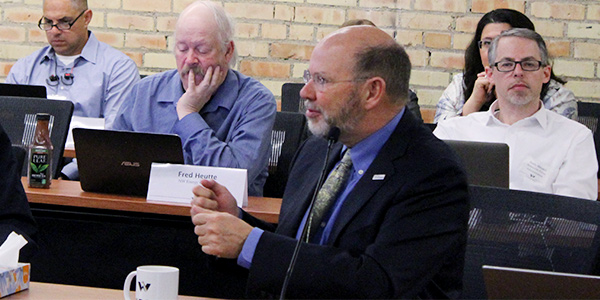By Hudson Sangree
NERC CEO Jim Robb returned to his former workplace at the Western Electricity Coordinating Council last week for the first time since he took the nation’s top reliability job 15 months ago.
His four years in Salt Lake City have proven useful in Atlanta and D.C., Robb told the WECC Board of Directors at its quarterly meeting. Many of the reliability challenges facing the U.S., including the shift to renewable energy and a major reliability coordinator transition, are centered in the Western Interconnection, which WECC oversees.
“The good news and the bad news, depending on how you feel about living in interesting times, is that almost all of these [challenges] have some amount of epicenter here in the West,” Robb said. “My training and experience here have served me very well in my new role on the Eastern seaboard.” (See New NERC Chief Not ‘Smartest Guy in the Room’.)
The RC transition that starts July 1, when CAISO takes over the role from Peak Reliability in CAISO’s California service territory, is a big concern for those whose job is to make sure the lights stay on, he said.
“The RC transition here in the West … I’ve described that as the single biggest reliability risk in the country over the next 18 months,” Robb said.
The new RCs taking over from Peak include CAISO’s RC West, SPP, BC Hydro and Gridforce. The transitions are planned on a staggered schedule through December. (See New RCs Tell WECC Transition on Schedule.)
Robb recognized the “tremendous amount of work going on” within those entities and at WECC to ensure a smooth handover, but he said people shouldn’t let their guard down. The new RCs “have to work together as seamlessly as one RC given the way the region is structured here,” he said. “That needs to continue to be a laser focus.”
Communications between multiple RCs in the Eastern Interconnection haven’t always met the “level of seamlessness and transparency” required, Robb said. In the West, lax performance would have even more of an impact on reliability, he said. (See RC Transition Fraught with Pitfalls, WECC Hears.)
Another major challenge is the pace of change in the mix of Western resources, he said. Traditional coal and nuclear baseload generation is being replaced by variable resources, such as wind and solar, with natural gas plants serving as backstops.
The switchover is “changing how we think about serving load,” Robb said.





